Comprehensive Analysis of Social Policies and Welfare in the UK
VerifiedAdded on 2023/04/17
|8
|2127
|459
Report
AI Summary
This report provides a comprehensive overview of social policies in the United Kingdom. It begins by outlining the historical development of social policy practices in the UK, including the evolution of the welfare state and the influence of key legislation such as the Poor Laws and the Beveridge Report. The report identifies prominent social issues, particularly poverty and social exclusion, and examines their effects on the UK population. It then explores the role of various ideologies, with a specific focus on neo-liberalism, in shaping social work practices and policies. The analysis includes a discussion of the debates surrounding neo-liberalism and its impact on social policy, including its effects on privatization, free trade, and the role of the private sector. The report also examines the impact of different political perspectives, such as those of the Left and Right wings, on social policies. Finally, the report concludes with a discussion of the need for new and refined ideologies to address the social well-being of UK inhabitants, recommending a re-evaluation of neo-liberal approaches in favor of more inclusive and effective strategies.
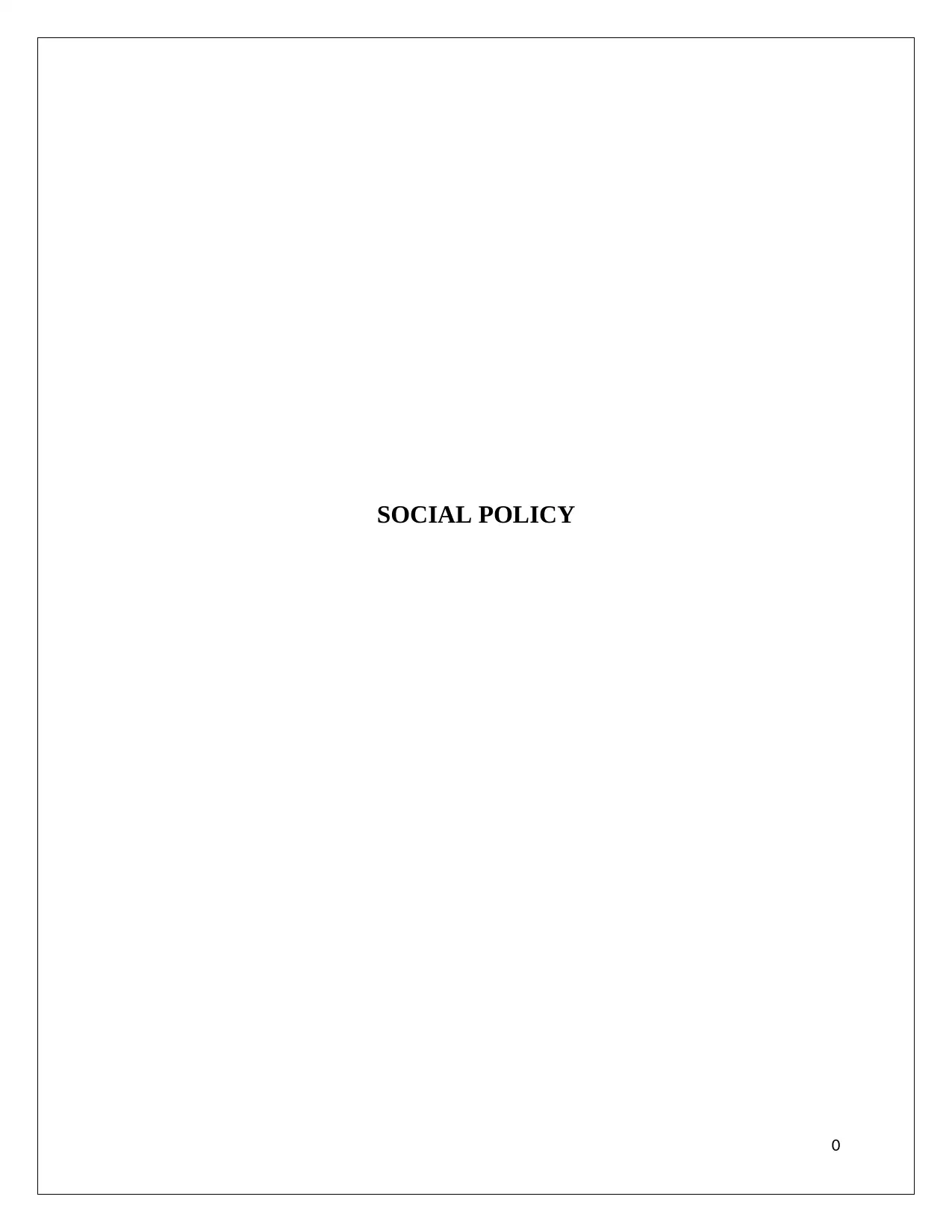
SOCIAL POLICY
0
0
Paraphrase This Document
Need a fresh take? Get an instant paraphrase of this document with our AI Paraphraser
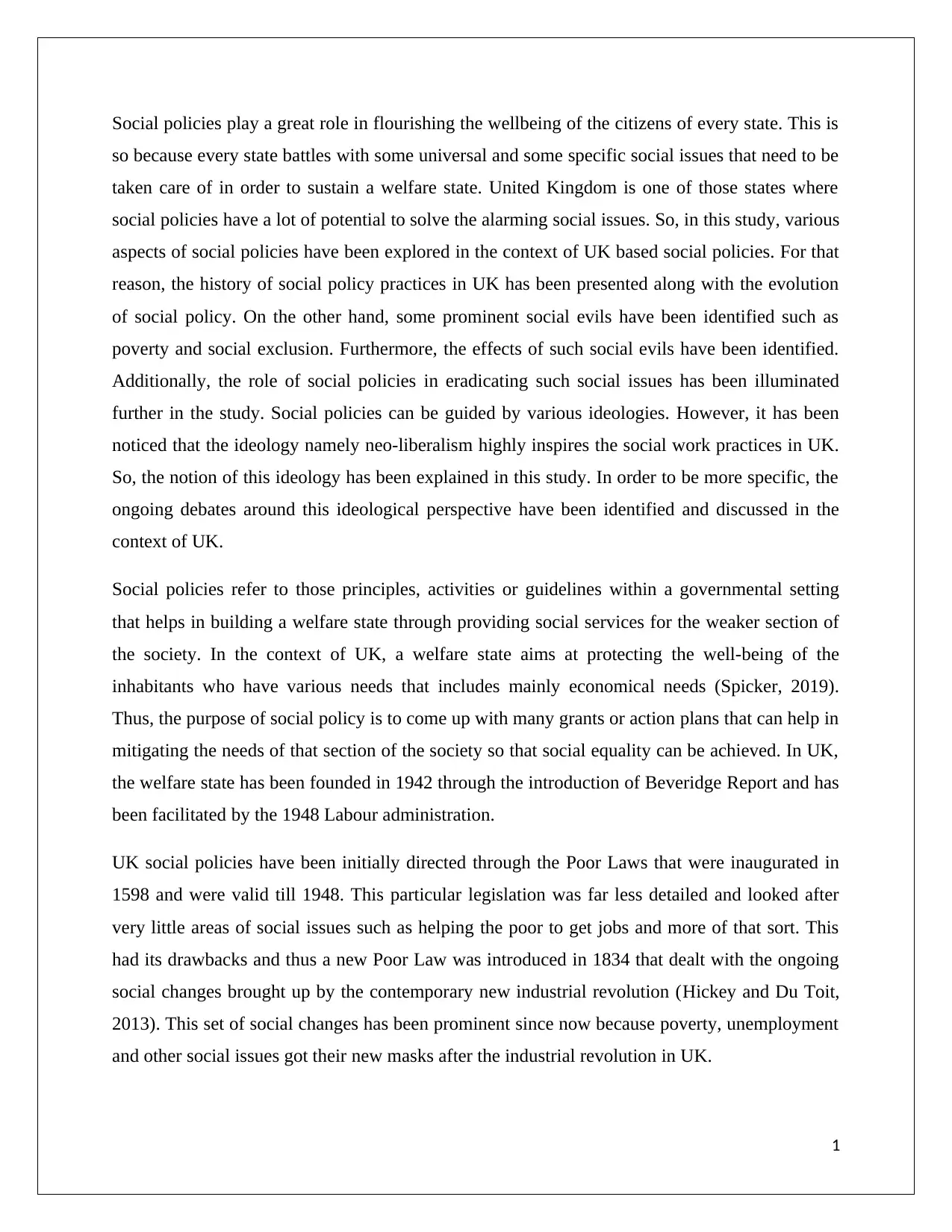
Social policies play a great role in flourishing the wellbeing of the citizens of every state. This is
so because every state battles with some universal and some specific social issues that need to be
taken care of in order to sustain a welfare state. United Kingdom is one of those states where
social policies have a lot of potential to solve the alarming social issues. So, in this study, various
aspects of social policies have been explored in the context of UK based social policies. For that
reason, the history of social policy practices in UK has been presented along with the evolution
of social policy. On the other hand, some prominent social evils have been identified such as
poverty and social exclusion. Furthermore, the effects of such social evils have been identified.
Additionally, the role of social policies in eradicating such social issues has been illuminated
further in the study. Social policies can be guided by various ideologies. However, it has been
noticed that the ideology namely neo-liberalism highly inspires the social work practices in UK.
So, the notion of this ideology has been explained in this study. In order to be more specific, the
ongoing debates around this ideological perspective have been identified and discussed in the
context of UK.
Social policies refer to those principles, activities or guidelines within a governmental setting
that helps in building a welfare state through providing social services for the weaker section of
the society. In the context of UK, a welfare state aims at protecting the well-being of the
inhabitants who have various needs that includes mainly economical needs (Spicker, 2019).
Thus, the purpose of social policy is to come up with many grants or action plans that can help in
mitigating the needs of that section of the society so that social equality can be achieved. In UK,
the welfare state has been founded in 1942 through the introduction of Beveridge Report and has
been facilitated by the 1948 Labour administration.
UK social policies have been initially directed through the Poor Laws that were inaugurated in
1598 and were valid till 1948. This particular legislation was far less detailed and looked after
very little areas of social issues such as helping the poor to get jobs and more of that sort. This
had its drawbacks and thus a new Poor Law was introduced in 1834 that dealt with the ongoing
social changes brought up by the contemporary new industrial revolution (Hickey and Du Toit,
2013). This set of social changes has been prominent since now because poverty, unemployment
and other social issues got their new masks after the industrial revolution in UK.
1
so because every state battles with some universal and some specific social issues that need to be
taken care of in order to sustain a welfare state. United Kingdom is one of those states where
social policies have a lot of potential to solve the alarming social issues. So, in this study, various
aspects of social policies have been explored in the context of UK based social policies. For that
reason, the history of social policy practices in UK has been presented along with the evolution
of social policy. On the other hand, some prominent social evils have been identified such as
poverty and social exclusion. Furthermore, the effects of such social evils have been identified.
Additionally, the role of social policies in eradicating such social issues has been illuminated
further in the study. Social policies can be guided by various ideologies. However, it has been
noticed that the ideology namely neo-liberalism highly inspires the social work practices in UK.
So, the notion of this ideology has been explained in this study. In order to be more specific, the
ongoing debates around this ideological perspective have been identified and discussed in the
context of UK.
Social policies refer to those principles, activities or guidelines within a governmental setting
that helps in building a welfare state through providing social services for the weaker section of
the society. In the context of UK, a welfare state aims at protecting the well-being of the
inhabitants who have various needs that includes mainly economical needs (Spicker, 2019).
Thus, the purpose of social policy is to come up with many grants or action plans that can help in
mitigating the needs of that section of the society so that social equality can be achieved. In UK,
the welfare state has been founded in 1942 through the introduction of Beveridge Report and has
been facilitated by the 1948 Labour administration.
UK social policies have been initially directed through the Poor Laws that were inaugurated in
1598 and were valid till 1948. This particular legislation was far less detailed and looked after
very little areas of social issues such as helping the poor to get jobs and more of that sort. This
had its drawbacks and thus a new Poor Law was introduced in 1834 that dealt with the ongoing
social changes brought up by the contemporary new industrial revolution (Hickey and Du Toit,
2013). This set of social changes has been prominent since now because poverty, unemployment
and other social issues got their new masks after the industrial revolution in UK.
1
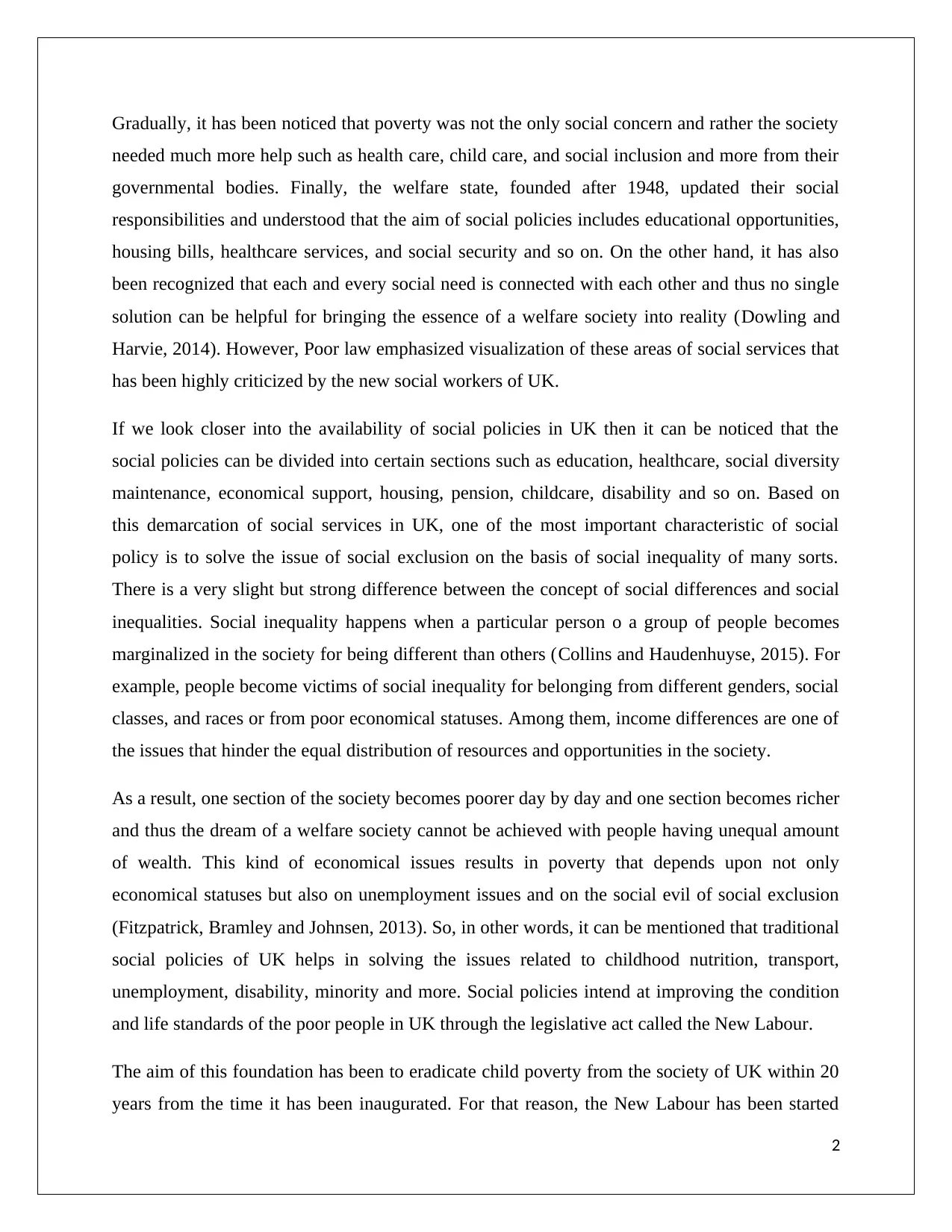
Gradually, it has been noticed that poverty was not the only social concern and rather the society
needed much more help such as health care, child care, and social inclusion and more from their
governmental bodies. Finally, the welfare state, founded after 1948, updated their social
responsibilities and understood that the aim of social policies includes educational opportunities,
housing bills, healthcare services, and social security and so on. On the other hand, it has also
been recognized that each and every social need is connected with each other and thus no single
solution can be helpful for bringing the essence of a welfare society into reality (Dowling and
Harvie, 2014). However, Poor law emphasized visualization of these areas of social services that
has been highly criticized by the new social workers of UK.
If we look closer into the availability of social policies in UK then it can be noticed that the
social policies can be divided into certain sections such as education, healthcare, social diversity
maintenance, economical support, housing, pension, childcare, disability and so on. Based on
this demarcation of social services in UK, one of the most important characteristic of social
policy is to solve the issue of social exclusion on the basis of social inequality of many sorts.
There is a very slight but strong difference between the concept of social differences and social
inequalities. Social inequality happens when a particular person o a group of people becomes
marginalized in the society for being different than others (Collins and Haudenhuyse, 2015). For
example, people become victims of social inequality for belonging from different genders, social
classes, and races or from poor economical statuses. Among them, income differences are one of
the issues that hinder the equal distribution of resources and opportunities in the society.
As a result, one section of the society becomes poorer day by day and one section becomes richer
and thus the dream of a welfare society cannot be achieved with people having unequal amount
of wealth. This kind of economical issues results in poverty that depends upon not only
economical statuses but also on unemployment issues and on the social evil of social exclusion
(Fitzpatrick, Bramley and Johnsen, 2013). So, in other words, it can be mentioned that traditional
social policies of UK helps in solving the issues related to childhood nutrition, transport,
unemployment, disability, minority and more. Social policies intend at improving the condition
and life standards of the poor people in UK through the legislative act called the New Labour.
The aim of this foundation has been to eradicate child poverty from the society of UK within 20
years from the time it has been inaugurated. For that reason, the New Labour has been started
2
needed much more help such as health care, child care, and social inclusion and more from their
governmental bodies. Finally, the welfare state, founded after 1948, updated their social
responsibilities and understood that the aim of social policies includes educational opportunities,
housing bills, healthcare services, and social security and so on. On the other hand, it has also
been recognized that each and every social need is connected with each other and thus no single
solution can be helpful for bringing the essence of a welfare society into reality (Dowling and
Harvie, 2014). However, Poor law emphasized visualization of these areas of social services that
has been highly criticized by the new social workers of UK.
If we look closer into the availability of social policies in UK then it can be noticed that the
social policies can be divided into certain sections such as education, healthcare, social diversity
maintenance, economical support, housing, pension, childcare, disability and so on. Based on
this demarcation of social services in UK, one of the most important characteristic of social
policy is to solve the issue of social exclusion on the basis of social inequality of many sorts.
There is a very slight but strong difference between the concept of social differences and social
inequalities. Social inequality happens when a particular person o a group of people becomes
marginalized in the society for being different than others (Collins and Haudenhuyse, 2015). For
example, people become victims of social inequality for belonging from different genders, social
classes, and races or from poor economical statuses. Among them, income differences are one of
the issues that hinder the equal distribution of resources and opportunities in the society.
As a result, one section of the society becomes poorer day by day and one section becomes richer
and thus the dream of a welfare society cannot be achieved with people having unequal amount
of wealth. This kind of economical issues results in poverty that depends upon not only
economical statuses but also on unemployment issues and on the social evil of social exclusion
(Fitzpatrick, Bramley and Johnsen, 2013). So, in other words, it can be mentioned that traditional
social policies of UK helps in solving the issues related to childhood nutrition, transport,
unemployment, disability, minority and more. Social policies intend at improving the condition
and life standards of the poor people in UK through the legislative act called the New Labour.
The aim of this foundation has been to eradicate child poverty from the society of UK within 20
years from the time it has been inaugurated. For that reason, the New Labour has been started
2
⊘ This is a preview!⊘
Do you want full access?
Subscribe today to unlock all pages.

Trusted by 1+ million students worldwide
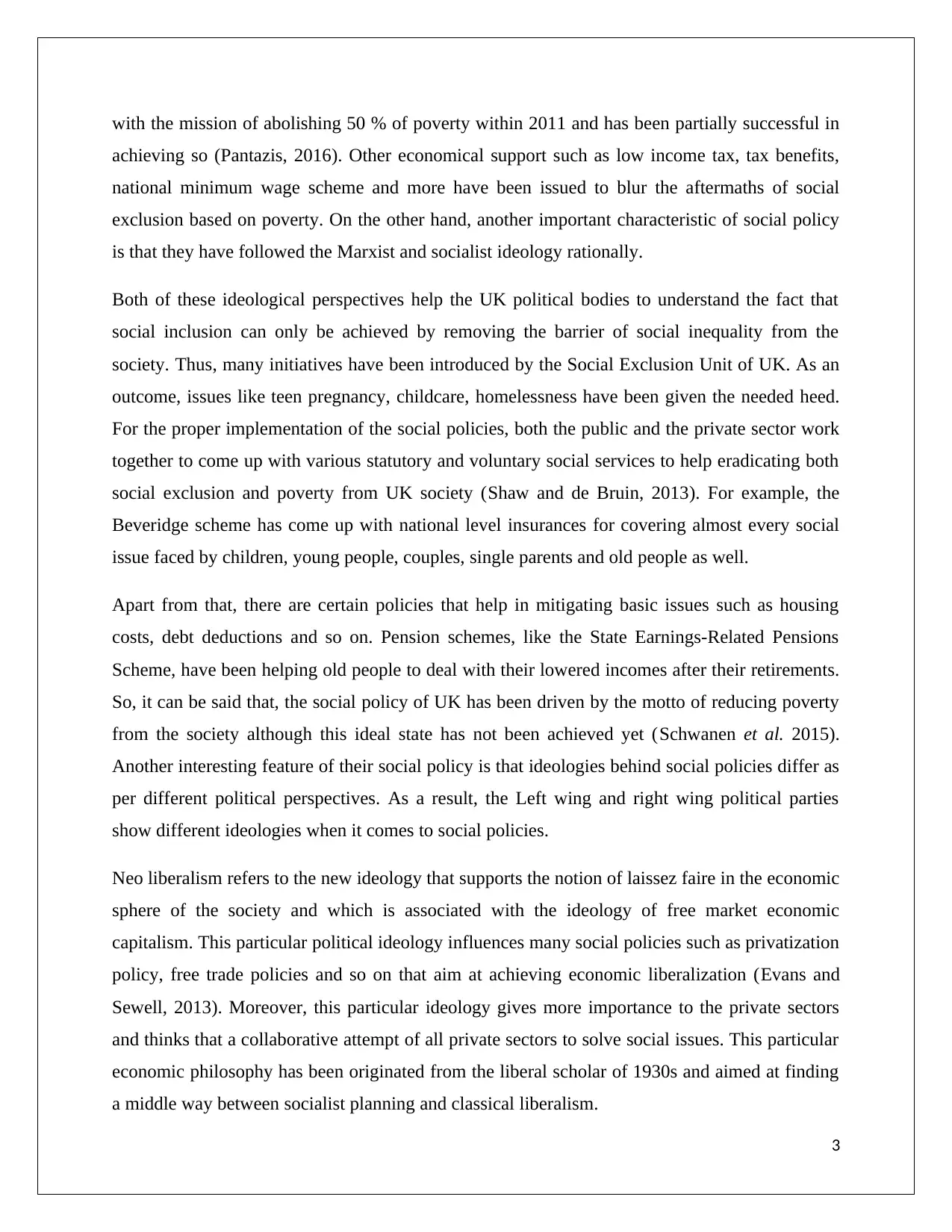
with the mission of abolishing 50 % of poverty within 2011 and has been partially successful in
achieving so (Pantazis, 2016). Other economical support such as low income tax, tax benefits,
national minimum wage scheme and more have been issued to blur the aftermaths of social
exclusion based on poverty. On the other hand, another important characteristic of social policy
is that they have followed the Marxist and socialist ideology rationally.
Both of these ideological perspectives help the UK political bodies to understand the fact that
social inclusion can only be achieved by removing the barrier of social inequality from the
society. Thus, many initiatives have been introduced by the Social Exclusion Unit of UK. As an
outcome, issues like teen pregnancy, childcare, homelessness have been given the needed heed.
For the proper implementation of the social policies, both the public and the private sector work
together to come up with various statutory and voluntary social services to help eradicating both
social exclusion and poverty from UK society (Shaw and de Bruin, 2013). For example, the
Beveridge scheme has come up with national level insurances for covering almost every social
issue faced by children, young people, couples, single parents and old people as well.
Apart from that, there are certain policies that help in mitigating basic issues such as housing
costs, debt deductions and so on. Pension schemes, like the State Earnings-Related Pensions
Scheme, have been helping old people to deal with their lowered incomes after their retirements.
So, it can be said that, the social policy of UK has been driven by the motto of reducing poverty
from the society although this ideal state has not been achieved yet (Schwanen et al. 2015).
Another interesting feature of their social policy is that ideologies behind social policies differ as
per different political perspectives. As a result, the Left wing and right wing political parties
show different ideologies when it comes to social policies.
Neo liberalism refers to the new ideology that supports the notion of laissez faire in the economic
sphere of the society and which is associated with the ideology of free market economic
capitalism. This particular political ideology influences many social policies such as privatization
policy, free trade policies and so on that aim at achieving economic liberalization (Evans and
Sewell, 2013). Moreover, this particular ideology gives more importance to the private sectors
and thinks that a collaborative attempt of all private sectors to solve social issues. This particular
economic philosophy has been originated from the liberal scholar of 1930s and aimed at finding
a middle way between socialist planning and classical liberalism.
3
achieving so (Pantazis, 2016). Other economical support such as low income tax, tax benefits,
national minimum wage scheme and more have been issued to blur the aftermaths of social
exclusion based on poverty. On the other hand, another important characteristic of social policy
is that they have followed the Marxist and socialist ideology rationally.
Both of these ideological perspectives help the UK political bodies to understand the fact that
social inclusion can only be achieved by removing the barrier of social inequality from the
society. Thus, many initiatives have been introduced by the Social Exclusion Unit of UK. As an
outcome, issues like teen pregnancy, childcare, homelessness have been given the needed heed.
For the proper implementation of the social policies, both the public and the private sector work
together to come up with various statutory and voluntary social services to help eradicating both
social exclusion and poverty from UK society (Shaw and de Bruin, 2013). For example, the
Beveridge scheme has come up with national level insurances for covering almost every social
issue faced by children, young people, couples, single parents and old people as well.
Apart from that, there are certain policies that help in mitigating basic issues such as housing
costs, debt deductions and so on. Pension schemes, like the State Earnings-Related Pensions
Scheme, have been helping old people to deal with their lowered incomes after their retirements.
So, it can be said that, the social policy of UK has been driven by the motto of reducing poverty
from the society although this ideal state has not been achieved yet (Schwanen et al. 2015).
Another interesting feature of their social policy is that ideologies behind social policies differ as
per different political perspectives. As a result, the Left wing and right wing political parties
show different ideologies when it comes to social policies.
Neo liberalism refers to the new ideology that supports the notion of laissez faire in the economic
sphere of the society and which is associated with the ideology of free market economic
capitalism. This particular political ideology influences many social policies such as privatization
policy, free trade policies and so on that aim at achieving economic liberalization (Evans and
Sewell, 2013). Moreover, this particular ideology gives more importance to the private sectors
and thinks that a collaborative attempt of all private sectors to solve social issues. This particular
economic philosophy has been originated from the liberal scholar of 1930s and aimed at finding
a middle way between socialist planning and classical liberalism.
3
Paraphrase This Document
Need a fresh take? Get an instant paraphrase of this document with our AI Paraphraser
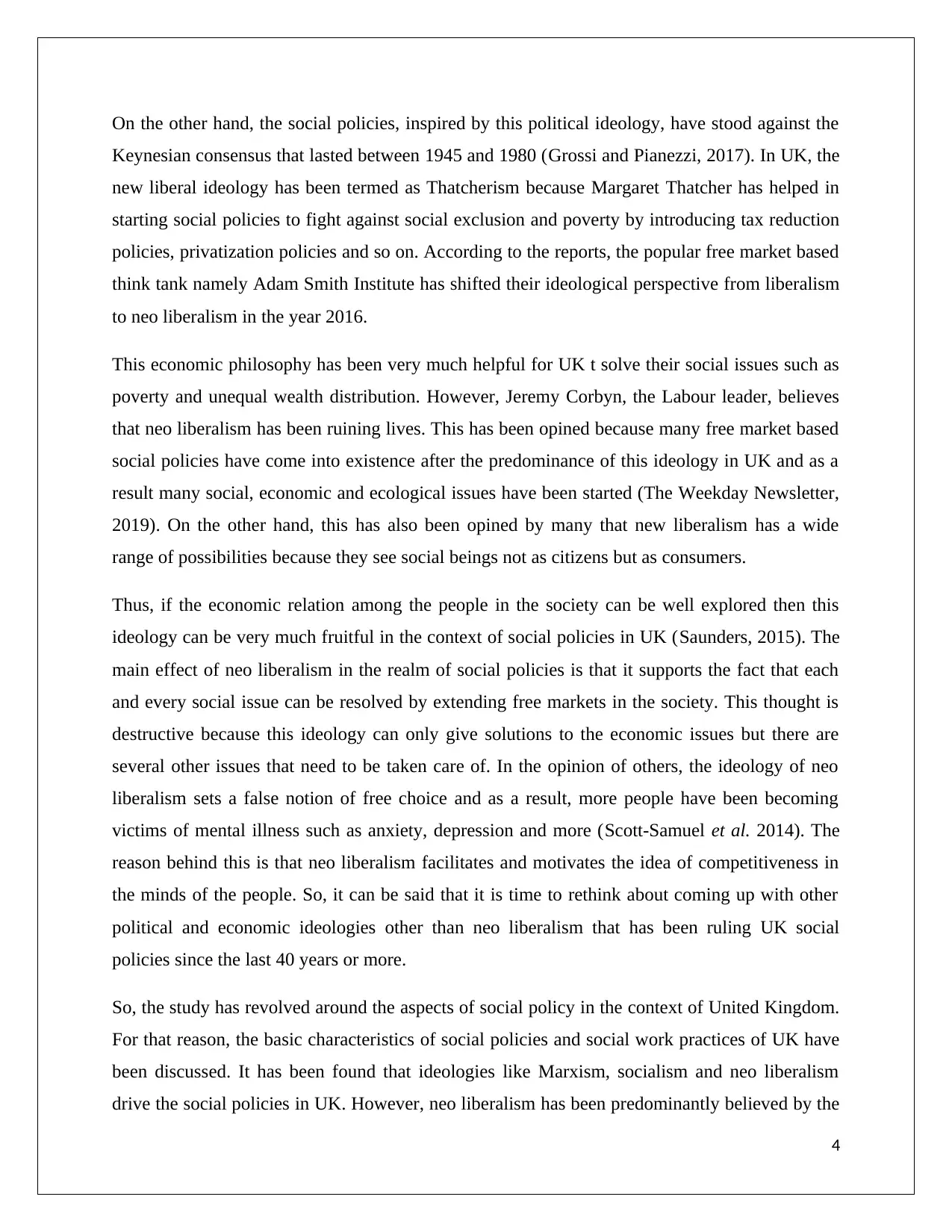
On the other hand, the social policies, inspired by this political ideology, have stood against the
Keynesian consensus that lasted between 1945 and 1980 (Grossi and Pianezzi, 2017). In UK, the
new liberal ideology has been termed as Thatcherism because Margaret Thatcher has helped in
starting social policies to fight against social exclusion and poverty by introducing tax reduction
policies, privatization policies and so on. According to the reports, the popular free market based
think tank namely Adam Smith Institute has shifted their ideological perspective from liberalism
to neo liberalism in the year 2016.
This economic philosophy has been very much helpful for UK t solve their social issues such as
poverty and unequal wealth distribution. However, Jeremy Corbyn, the Labour leader, believes
that neo liberalism has been ruining lives. This has been opined because many free market based
social policies have come into existence after the predominance of this ideology in UK and as a
result many social, economic and ecological issues have been started (The Weekday Newsletter,
2019). On the other hand, this has also been opined by many that new liberalism has a wide
range of possibilities because they see social beings not as citizens but as consumers.
Thus, if the economic relation among the people in the society can be well explored then this
ideology can be very much fruitful in the context of social policies in UK (Saunders, 2015). The
main effect of neo liberalism in the realm of social policies is that it supports the fact that each
and every social issue can be resolved by extending free markets in the society. This thought is
destructive because this ideology can only give solutions to the economic issues but there are
several other issues that need to be taken care of. In the opinion of others, the ideology of neo
liberalism sets a false notion of free choice and as a result, more people have been becoming
victims of mental illness such as anxiety, depression and more (Scott-Samuel et al. 2014). The
reason behind this is that neo liberalism facilitates and motivates the idea of competitiveness in
the minds of the people. So, it can be said that it is time to rethink about coming up with other
political and economic ideologies other than neo liberalism that has been ruling UK social
policies since the last 40 years or more.
So, the study has revolved around the aspects of social policy in the context of United Kingdom.
For that reason, the basic characteristics of social policies and social work practices of UK have
been discussed. It has been found that ideologies like Marxism, socialism and neo liberalism
drive the social policies in UK. However, neo liberalism has been predominantly believed by the
4
Keynesian consensus that lasted between 1945 and 1980 (Grossi and Pianezzi, 2017). In UK, the
new liberal ideology has been termed as Thatcherism because Margaret Thatcher has helped in
starting social policies to fight against social exclusion and poverty by introducing tax reduction
policies, privatization policies and so on. According to the reports, the popular free market based
think tank namely Adam Smith Institute has shifted their ideological perspective from liberalism
to neo liberalism in the year 2016.
This economic philosophy has been very much helpful for UK t solve their social issues such as
poverty and unequal wealth distribution. However, Jeremy Corbyn, the Labour leader, believes
that neo liberalism has been ruining lives. This has been opined because many free market based
social policies have come into existence after the predominance of this ideology in UK and as a
result many social, economic and ecological issues have been started (The Weekday Newsletter,
2019). On the other hand, this has also been opined by many that new liberalism has a wide
range of possibilities because they see social beings not as citizens but as consumers.
Thus, if the economic relation among the people in the society can be well explored then this
ideology can be very much fruitful in the context of social policies in UK (Saunders, 2015). The
main effect of neo liberalism in the realm of social policies is that it supports the fact that each
and every social issue can be resolved by extending free markets in the society. This thought is
destructive because this ideology can only give solutions to the economic issues but there are
several other issues that need to be taken care of. In the opinion of others, the ideology of neo
liberalism sets a false notion of free choice and as a result, more people have been becoming
victims of mental illness such as anxiety, depression and more (Scott-Samuel et al. 2014). The
reason behind this is that neo liberalism facilitates and motivates the idea of competitiveness in
the minds of the people. So, it can be said that it is time to rethink about coming up with other
political and economic ideologies other than neo liberalism that has been ruling UK social
policies since the last 40 years or more.
So, the study has revolved around the aspects of social policy in the context of United Kingdom.
For that reason, the basic characteristics of social policies and social work practices of UK have
been discussed. It has been found that ideologies like Marxism, socialism and neo liberalism
drive the social policies in UK. However, neo liberalism has been predominantly believed by the
4
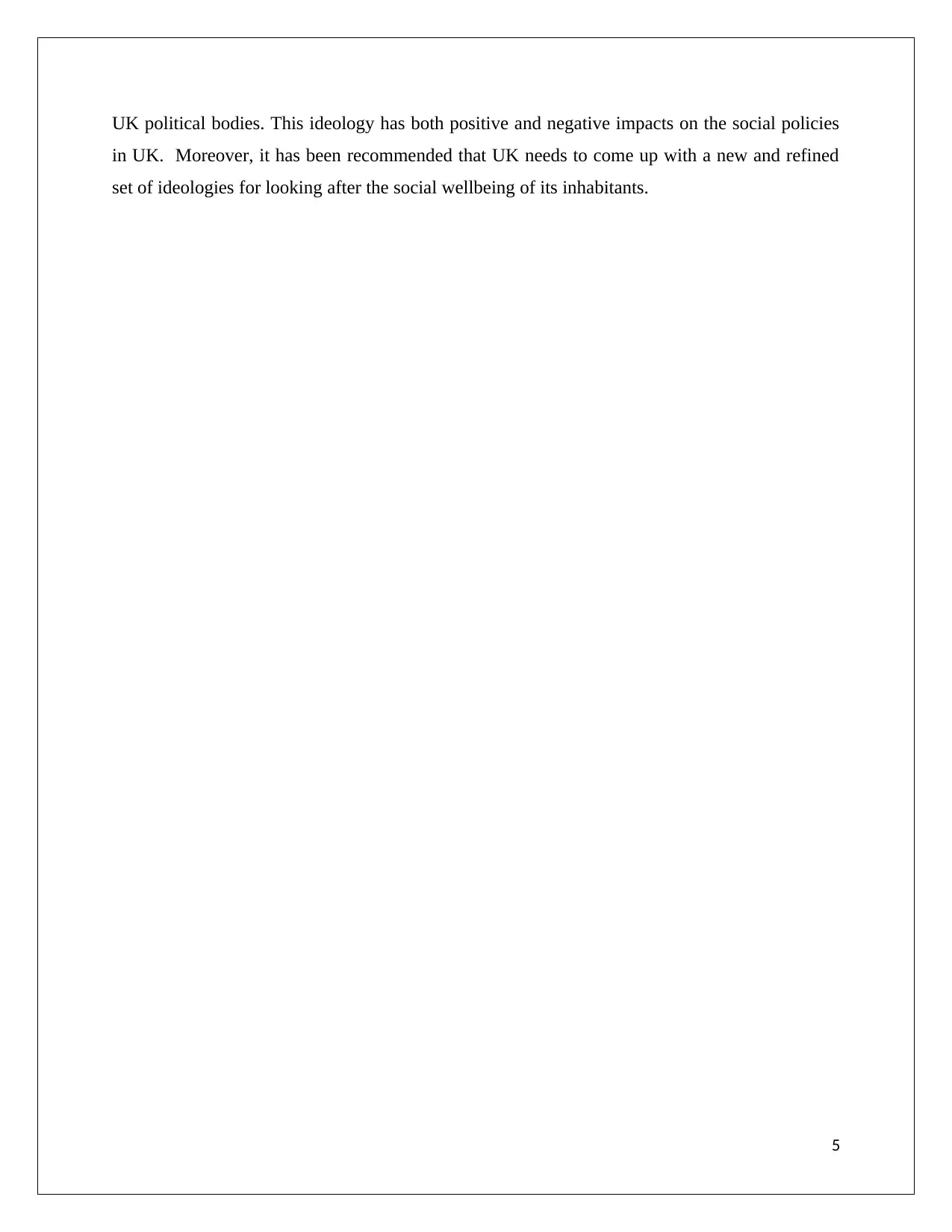
UK political bodies. This ideology has both positive and negative impacts on the social policies
in UK. Moreover, it has been recommended that UK needs to come up with a new and refined
set of ideologies for looking after the social wellbeing of its inhabitants.
5
in UK. Moreover, it has been recommended that UK needs to come up with a new and refined
set of ideologies for looking after the social wellbeing of its inhabitants.
5
⊘ This is a preview!⊘
Do you want full access?
Subscribe today to unlock all pages.

Trusted by 1+ million students worldwide
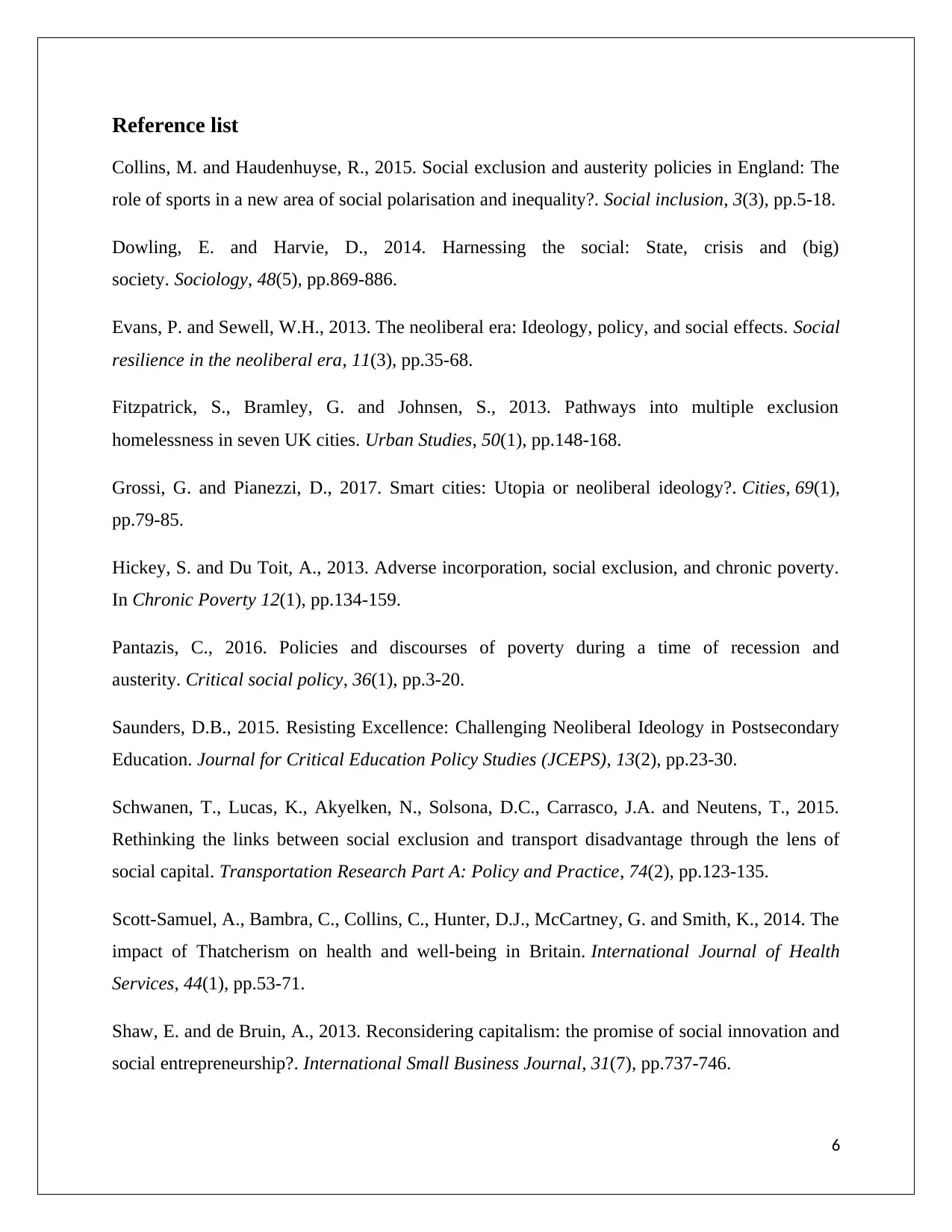
Reference list
Collins, M. and Haudenhuyse, R., 2015. Social exclusion and austerity policies in England: The
role of sports in a new area of social polarisation and inequality?. Social inclusion, 3(3), pp.5-18.
Dowling, E. and Harvie, D., 2014. Harnessing the social: State, crisis and (big)
society. Sociology, 48(5), pp.869-886.
Evans, P. and Sewell, W.H., 2013. The neoliberal era: Ideology, policy, and social effects. Social
resilience in the neoliberal era, 11(3), pp.35-68.
Fitzpatrick, S., Bramley, G. and Johnsen, S., 2013. Pathways into multiple exclusion
homelessness in seven UK cities. Urban Studies, 50(1), pp.148-168.
Grossi, G. and Pianezzi, D., 2017. Smart cities: Utopia or neoliberal ideology?. Cities, 69(1),
pp.79-85.
Hickey, S. and Du Toit, A., 2013. Adverse incorporation, social exclusion, and chronic poverty.
In Chronic Poverty 12(1), pp.134-159.
Pantazis, C., 2016. Policies and discourses of poverty during a time of recession and
austerity. Critical social policy, 36(1), pp.3-20.
Saunders, D.B., 2015. Resisting Excellence: Challenging Neoliberal Ideology in Postsecondary
Education. Journal for Critical Education Policy Studies (JCEPS), 13(2), pp.23-30.
Schwanen, T., Lucas, K., Akyelken, N., Solsona, D.C., Carrasco, J.A. and Neutens, T., 2015.
Rethinking the links between social exclusion and transport disadvantage through the lens of
social capital. Transportation Research Part A: Policy and Practice, 74(2), pp.123-135.
Scott-Samuel, A., Bambra, C., Collins, C., Hunter, D.J., McCartney, G. and Smith, K., 2014. The
impact of Thatcherism on health and well-being in Britain. International Journal of Health
Services, 44(1), pp.53-71.
Shaw, E. and de Bruin, A., 2013. Reconsidering capitalism: the promise of social innovation and
social entrepreneurship?. International Small Business Journal, 31(7), pp.737-746.
6
Collins, M. and Haudenhuyse, R., 2015. Social exclusion and austerity policies in England: The
role of sports in a new area of social polarisation and inequality?. Social inclusion, 3(3), pp.5-18.
Dowling, E. and Harvie, D., 2014. Harnessing the social: State, crisis and (big)
society. Sociology, 48(5), pp.869-886.
Evans, P. and Sewell, W.H., 2013. The neoliberal era: Ideology, policy, and social effects. Social
resilience in the neoliberal era, 11(3), pp.35-68.
Fitzpatrick, S., Bramley, G. and Johnsen, S., 2013. Pathways into multiple exclusion
homelessness in seven UK cities. Urban Studies, 50(1), pp.148-168.
Grossi, G. and Pianezzi, D., 2017. Smart cities: Utopia or neoliberal ideology?. Cities, 69(1),
pp.79-85.
Hickey, S. and Du Toit, A., 2013. Adverse incorporation, social exclusion, and chronic poverty.
In Chronic Poverty 12(1), pp.134-159.
Pantazis, C., 2016. Policies and discourses of poverty during a time of recession and
austerity. Critical social policy, 36(1), pp.3-20.
Saunders, D.B., 2015. Resisting Excellence: Challenging Neoliberal Ideology in Postsecondary
Education. Journal for Critical Education Policy Studies (JCEPS), 13(2), pp.23-30.
Schwanen, T., Lucas, K., Akyelken, N., Solsona, D.C., Carrasco, J.A. and Neutens, T., 2015.
Rethinking the links between social exclusion and transport disadvantage through the lens of
social capital. Transportation Research Part A: Policy and Practice, 74(2), pp.123-135.
Scott-Samuel, A., Bambra, C., Collins, C., Hunter, D.J., McCartney, G. and Smith, K., 2014. The
impact of Thatcherism on health and well-being in Britain. International Journal of Health
Services, 44(1), pp.53-71.
Shaw, E. and de Bruin, A., 2013. Reconsidering capitalism: the promise of social innovation and
social entrepreneurship?. International Small Business Journal, 31(7), pp.737-746.
6
Paraphrase This Document
Need a fresh take? Get an instant paraphrase of this document with our AI Paraphraser
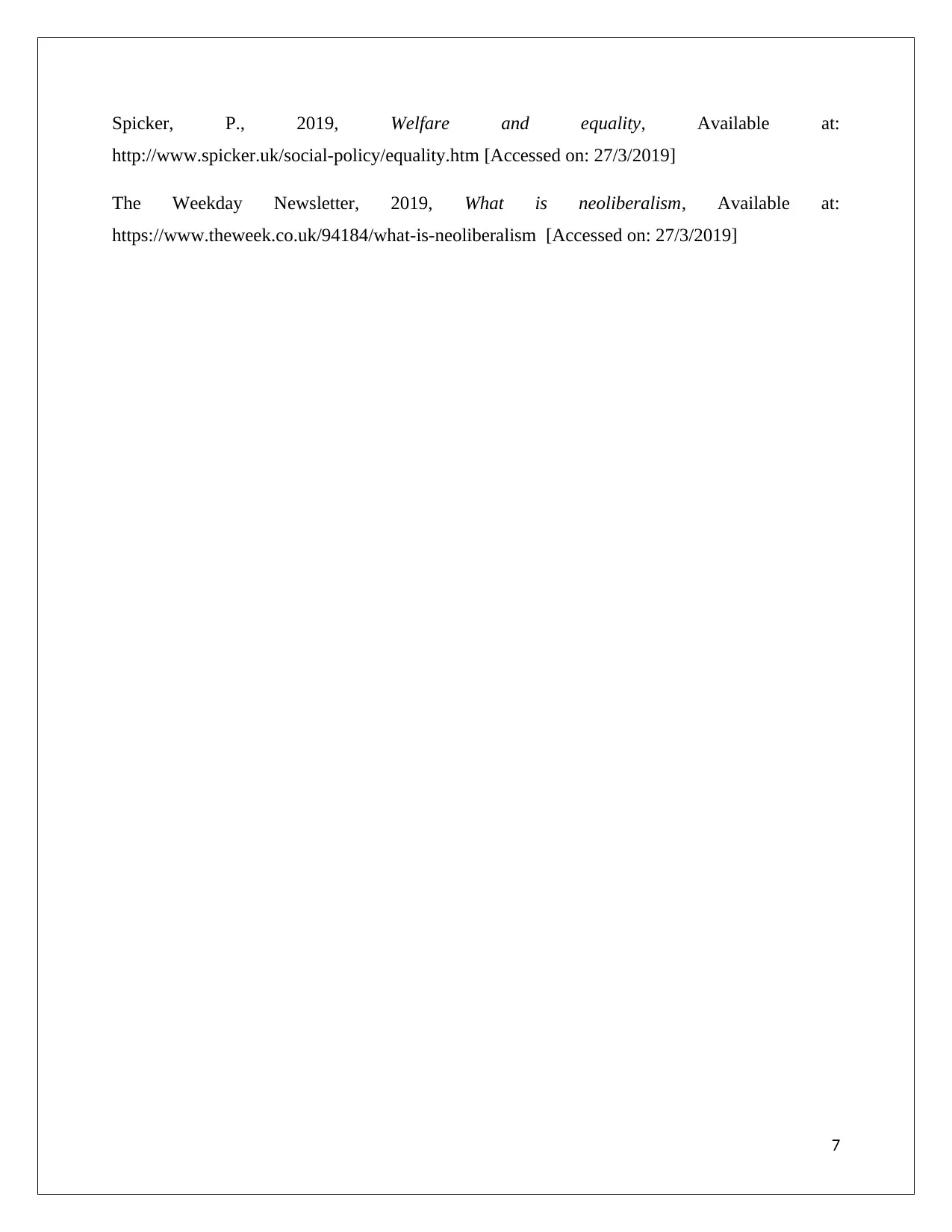
Spicker, P., 2019, Welfare and equality, Available at:
http://www.spicker.uk/social-policy/equality.htm [Accessed on: 27/3/2019]
The Weekday Newsletter, 2019, What is neoliberalism, Available at:
https://www.theweek.co.uk/94184/what-is-neoliberalism [Accessed on: 27/3/2019]
7
http://www.spicker.uk/social-policy/equality.htm [Accessed on: 27/3/2019]
The Weekday Newsletter, 2019, What is neoliberalism, Available at:
https://www.theweek.co.uk/94184/what-is-neoliberalism [Accessed on: 27/3/2019]
7
1 out of 8
Related Documents
Your All-in-One AI-Powered Toolkit for Academic Success.
+13062052269
info@desklib.com
Available 24*7 on WhatsApp / Email
![[object Object]](/_next/static/media/star-bottom.7253800d.svg)
Unlock your academic potential
Copyright © 2020–2026 A2Z Services. All Rights Reserved. Developed and managed by ZUCOL.





